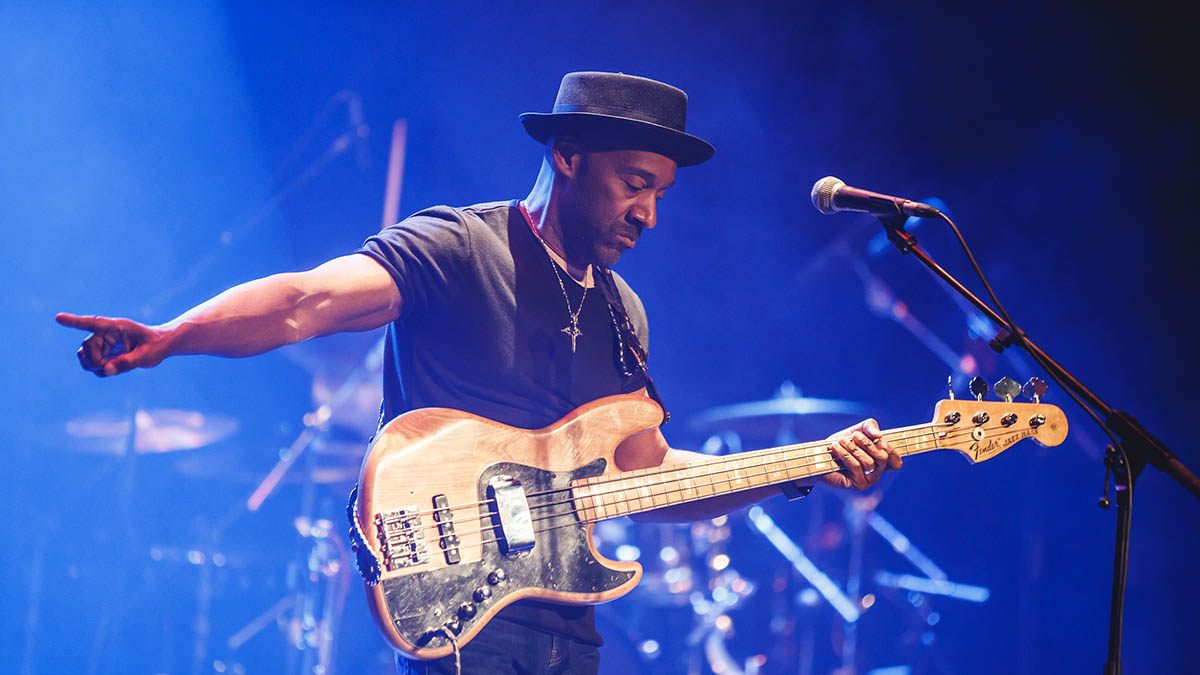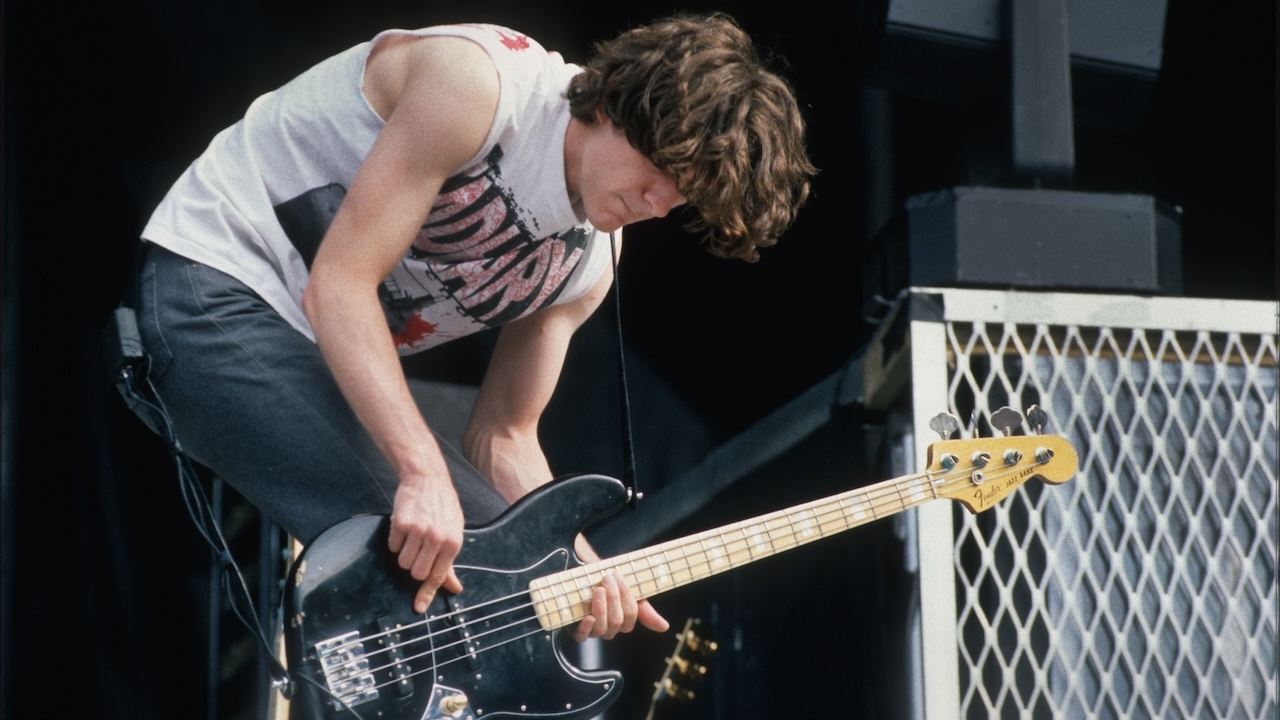Marcus Miller: “I try to play from my ears and not from my fingers”
As Miller receives his Lifetime Achievement Award from Bass Player, he talks about the role of producer and explains why a formal musical education can help your career

All the latest guitar news, interviews, lessons, reviews, deals and more, direct to your inbox!
You are now subscribed
Your newsletter sign-up was successful
Bassist extraordinaire, saxophonist, producer, composer, session musician, and one-man phenomenon Marcus Miller will require little introduction for most readers of this magazine.
He first came to prominence as a member of Miles Davis’s band in 1981, remaining with the jazz icon for the next eight years, and then built a phenomenal catalog of over 500 session performances, playing with Aretha Franklin, Michael Jackson, Herbie Hancock, Eric Clapton, Wayne Shorter, McCoy Tyner, Frank Sinatra, George Benson, Elton John, Donald Fagen, and many, many other top-flight artists.
A high point came when Miller, Victor Wooten, and Stanley Clarke joined forces as SMV in 2008. Few bassists are as overdue for our Lifetime Achievement award as Miller: we’re glad we can now rectify that situation.
We’re delighted to present you with a Lifetime Achievement award, Marcus.
“Well, thank you. It’s very nice and I appreciate it. I’ve been playing bass professionally since the '70s, so it feels great, especially after the last two years. I’m finally starting to play gigs and also do some producing.”
How do you view the role of producer?
“You know, the producer basically supplies whatever is necessary. In some projects, my job is to help the artists get the best version of their vision that they can. In other projects, the artists are actually looking for me to help provide them with a sound.
All the latest guitar news, interviews, lessons, reviews, deals and more, direct to your inbox!
If you have great ears, you have great ears, but a formal music education allows you to communicate with people
“When I produced Miles Davis, it was more like, ‘Hey, Miles, here’s a new direction if you’re into it,’ but when I worked with Luther Vandross, it was more about me helping him communicate with his musicians. I helped him with the orchestrations and with the mixing, in those more supportive roles – so whatever it is that is needed, that is what the producer will supply.
“But you know, it’s the same as when you were in your garage with your band when you were a teenager, working stuff out and recording it. You’d hear it back and say, ‘Hey, maybe when we do this guitar part, you might want to do something different?’ You know what I mean? It’s just a more official version.”
Should bass players study music formally?
“Yes. I mean, if you have great ears, you have great ears, but a formal music education allows you to communicate with people, right?
“If you’re a musician who can’t read music, and you have a session coming up, you can say, ‘Hey, can you send me the track a few days early, so I can learn it?’, but when I was coming up as a musician, nobody would be sending you a track early.
“The arranger was writing the arrangement in a taxicab on the way to the studio! When you got to the studio, you had to read it fast, because studio time was expensive. So an education makes things go faster, and it allows people to communicate easier.”
What’s your current gear setup?
“I play my Sire basses, and then there’s my signature Markbass amp, along with Dunlop strings.”
How have you changed as a bass player over the years?
“I think that what I’ve been working on is clarity of thought, clarity of improvisation. I play in digestible phrases, you know. I try to play from my ears and not from my fingers. With a lot of musicians, I can hear their fingers are doing the thinking.
“Wherever they can get to on their instrument is what they play, but for me, I want to make my bass do what I’m imagining. I want to continue to develop the connection between my ideas.
I’m just really grateful to be around, and to see how music is evolving
“The other thing is that I had a sound that I developed in the early '80s, so my challenge was, how do I get that sound to fit in the changing times since then? It’s a voice that I’m not willing to abandon, but at the same time, I don’t want my game to sound like it’s 1983. So I’ve had to alter what I’m doing in subtle ways so that it works with new styles.”
What are you most proud of, professionally speaking?
“Oh, man, I’m just proud of having a career. I’ve seen so many other people who’ve had substantial careers, and I’ve seen the whole arc of their career from beginning to end – and I’m still here.
“When I started out, man, they were doing the original soul and jazz, and I’ve been around long enough to see the resurgence of that music. I’ve seen techno, I’ve seen neo-soul, all that stuff. I’m just really grateful to be around, and to see how music is evolving.”
Bass Player is the world’s most comprehensive, trusted and insightful bass publication for passionate bassists and active musicians of all ages. Whatever your ability, BP has the interviews, reviews and lessons that will make you a better bass player. We go behind the scenes with bass manufacturers, ask a stellar crew of bass players for their advice, and bring you insights into pretty much every style of bass playing that exists, from reggae to jazz to metal and beyond. The gear we review ranges from the affordable to the upmarket and we maximise the opportunity to evolve our playing with the best teachers on the planet.

